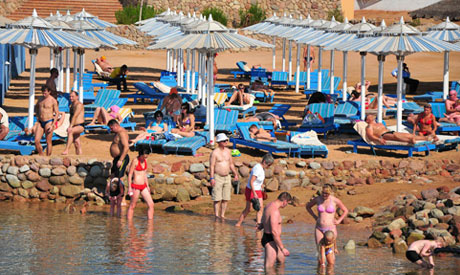
Tourism bookings in Egypt’s main Red Sea resort of Sharm el-Sheikh have plunged in the wake of a Russian plane crash, officials said Wednesday, amid fears the airliner may have been downed by a bomb.
Some 80 percent of reservations have been cancelled and at least 40 percent of tourists have left the Egyptian resort since the crash, said Hussein Fawzy, head of the region’s chamber of tourist facilities.
“They are not going to come back again. We will have nothing but a few Ukrainians and Belarusians,” he said by telephone.
Moscow has banned all flights to Egypt for at least several months, a severe blow for the tourism industry during the peak season for Russian visitors. Britain and Ireland have suspended flights to Sharm el-Sheikh.
U.S. and British officials say the cause of the Oct. 31 crash, which killed all 224 people on board, was likely a bomb planted on the plane.
Battered by years of political turmoil, Egypt’s vital tourism sector has been almost completely dependent on Russian and European tourists visiting Sharm el-Sheikh and other Red Sea resorts. Eastern European visitors, including people from former Soviet satellite states like Ukraine, made up 45 percent of all tourist arrivals in June.
Earlier Wednesday, Egyptian President Abdel-Fattah el-Sissi made a surprise visit to the Sharm el-Sheikh airport.
“Our visit today aims to reassure people inside and outside Egypt,” el-Sissi said after greeting some foreign tourists and wading through a packed terminal. “We want people who come here to be secure and safe and to live and go back safely to their countries,” he told private Egyptian broadcaster CBC.
The Metrojet Airbus A321 crashed in the Sinai Peninsula shortly after takeoff from Sharm el-Sheikh en route to St. Petersburg. Most of the passengers were Russian tourists returning home.
El-Sissi said authorities have carried out regular checks on all airports over the past few months, and that other countries had been involved in the inspections.
Also Wednesday, a Russian search and rescue team that was brought to Egypt after the crash flew home to Moscow. The team of 48 had been recovering bodies at the crash site, some 70 kilometers (44 miles) south of the peninsula’s northern city of el-Arish.
Other Russians remain in Egypt as part of the investigation committee seeking to determine the cause of the crash.
Moscow has said its ban on flights is necessary because of concerns about security at Egypt’s airports. Kremlin chief of staff Sergei Ivanov said Tuesday that the ban was expected to last for at least several months.

Leave a Reply
You must be logged in to post a comment.